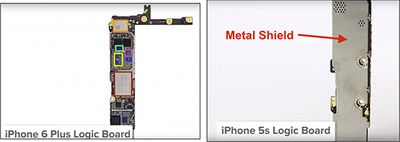Thomas Davidson of Pennsylvania, Todd Cleary of California, and Jun Bai of Delaware have filed a class action lawsuit against Apple over an alleged defect that causes iPhone 6 and iPhone 6 Plus touchscreens to become unresponsive and fail, according to court documents filed electronically this week.
The class action complaint, filed with the U.S. District Court for Northern California, accuses Apple of violating California's consumer fraud statutes, through fraud, negligent misrepresentation, breach of implied warranty, unjust enrichment, and for violations of the Magnuson-Moss Warranty Act and Song-Beverly Consumer Warranty Act.
Apple has long been aware of the defective iPhones. Yet, notwithstanding its longstanding knowledge of this design defect, Apple routinely has refused to repair the iPhones without charge when the defect manifests. Many other iPhone owners have communicated with Apple's employees and agents to request that Apple remedy and/or address the Touchscreen Defect and/or resultant damage at no expense. Apple has failed and/or refused to do so.
As a result of Apple’s unfair, deceptive and/or fraudulent business practices, owners of the iPhones, including Plaintiffs, have suffered an ascertainable loss of money and/or property and/or value. The unfair and deceptive trade practices committed by Apple were conducted in a manner giving rise to substantial aggravating circumstances.
The complaint, lodged by California law firm McCuneWright, LLP, seeks an order that requires Apple to repair, recall, and/or replace affected iPhones and to extend the warranties of those devices for a reasonable period of time. The plaintiffs also seek unspecified damages. A jury trial has been demanded.
The lawsuit cites repair website iFixit, which last week shared a blog post and video about the defect, nicknamed "touch disease." The defect presents as a gray flickering bar at the top of the screen and a display that's unresponsive or less responsive to touch. The problem is said to be caused by the touchscreen controller chips soldered to the iPhone's logic board losing contact after a period of normal usage.
The complaint specifically claims that Apple's failure to incorporate a "metal shield" or "underfill" over the logic board, as it did with the iPhone 5s and iPhone 5c respectively, makes the iPhone 6 and 6 Plus "substantially less durable to foreseeable and reasonable use by consumers and ultimately causes the touchscreen defect."

iFixit said the defect has affected a growing number of iPhone 6 and iPhone 6 Plus owners, citing its own repair shop colleagues and dozens of complaints on the Apple Support Communities. Multiple customers who brought their iPhones to Apple Stores were told that Apple doesn't recognize it as an issue and nothing could be done as their iPhones were no longer covered by warranty.
Update: Those that wish to join the class action lawsuit can contact law firm McCuneWright LLP.






















